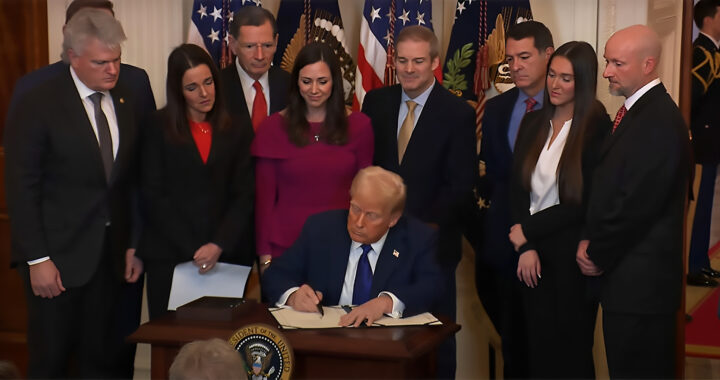Donald Trump signed the Laken Riley Act into law on 29 January 2025. This is the first law signed in his second term. This empowers the United States Department of Homeland Security to detain illegal immigrants involved in specific criminal activities.
What is the Laken Riley Act? How Does it Work? What are Its Criticisms?
Background
A bill was introduced in the U.S. Congress on 1 March 2024 following the murder of Laken Riley by an illegal immigrant. Riley was a 22-year-old nursing student at Augusta University who was murdered on 22 February 2024 while jogging at the University of Georgia. The perpetrator is the 26-year-old Venezuelan man identified as José Antonio Ibarra who entered the U.S. illegally in September 2022 via the southern border of the U.S. with Mexico.
The body of Riley was found in Oconee Forest Park near Lake Herrick. Her death was caused by blunt force trauma and asphyxiation according to forensics. The police found a jacket in a dumpster near the apartment of Ibarra. This item of clothing was found with hair strands from Riley. Surveillance footage identified Ibarra as the person who threw away the damning evidence in the dumpster. He was later arrested on murder charges on top of other related charges.
Ibarra was specifically charged with 10 counts, including felony murder, malice murder, false imprisonment, aggravated assault with intent to rape, and kidnapping. He was found guilty on all charges on 20 November 2024 and was sentenced to life in prison without parole. Ibarra had been arrested by state and federal officials in different jurisdictions and occasions. These included child endangerment, vehicle license violation, theft, and shoplifting charges.
Laken Riley Act
Mike Collins, a Republican serving as the U.S. Representative of Georgia, sponsored the Laken Riley Bill on 1 March 2024 in the U.S. House of Representatives. It was passed on 7 March 2024 by a 251-170 vote under the 118th Congress. The bill was reintroduced in the U.S. House of Representatives and U.S. Senate under the 119th Congress in January 2025.
U.S. Senator Katie Britt specifically introduced it on 6 January 2025 in the U.S. Senate. It was passed in the U.S. Senate with amendments on 20 January 2025 and was later passed in the U.S. House of Representatives on 22 January 2025. Donald Trump signed it into law on 29 January 2025. This is the first law he signed since assuming office for his second term.
The Laken Riley Act requires the Department of Homeland Security, through the Immigration and Customs Enforcement, to detain illegal immigrants who are charged with, arrested for, convicted of, admitting to having committed, or admitting to committing theft-related crimes, assaulting a police officer, or a crime that results in death or serious bodily injuries.
Lawmakers have foreseen how this law would increase detention. Hence, tucked in one of its provisions is the allocation of significant funding for expanding detention facilities and personnel. These include adding 118500 detention beds and hiring 4000 new staff. The Immigration and Customs Enforcement noted that compliance would cost USD 85 million.
The law also empowers a state government via its attorney general or authorized state officer to sue to Department of Homeland Security for alleged failures in immigration enforcement. This can occur if it is determined to be in violation of the detention and removal requirements of the law or if its alleged shortcomings result in harm to a particular state or its residents.
Examples of failures in immigration enforcement include releasing immigrants from custody or failing to detain immigrants set for deportation. Allowing states to sue the federal government gives them some power to set immigration policy. Note that several states have been trying to push back against decisions made under both the Trump and Biden administrations.
Criticisms
The Laken Riley Act is a Republican-sponsored law. Trump and other Republicans blamed former U.S. President Joe Biden for the murder of Riley because Ibarra was already arrested in September 2022 for illegal entry but was released to resolve his case in immigration court. A bill that prevents similar incidents from happening is aligned with the anti-illegal immigration rhetoric of Trump. Note that Laken Riley became part of his battle cry during his 2024 campaign.
However, despite being a legislative agenda associated with the Republican Party, 12 Democrats in the U.S. Senate and 46 Democrats in the U.S. House of Representatives supported it. It was still opposed by a large number of Democrats in the U.S. Congress. Most have been concerned with the fact that it denies migrants with due process. Some have underscored how it disadvantages minors and recipients of the Deferred Action for Childhood Arrivals program.
Several organizations like the American Immigration Council, American Civil Liberties Union, the Center for Constitutional Rights, the Jewish Council for Public Affairs, the National Education Association, the National Council of Churches, the United Church of Christ, and the Center for Law and Social Policy, among others, opposed the law while it was still a bill. Critics have argued that it requires detention and deportation for simply being charged with a crime.
FURTHER READINGS AND REFERENCES
- Brumback, K. 20 November 2024. “Man Convicted of Murder in Killing of Georgia Nursing Student Laken Riley.” AP. Available online
- Department of Homeland Security. 29 January 2025. “President Trump Signs the Laken Riley Act into Law.” Department of Homeland Security. Available online
- The Leadership Conference on Civil and Human Rights. 2025. Oppose S. F, The Laken Riley Act. The Leadership Conference on Civil and Human Rights. Available via PDF
